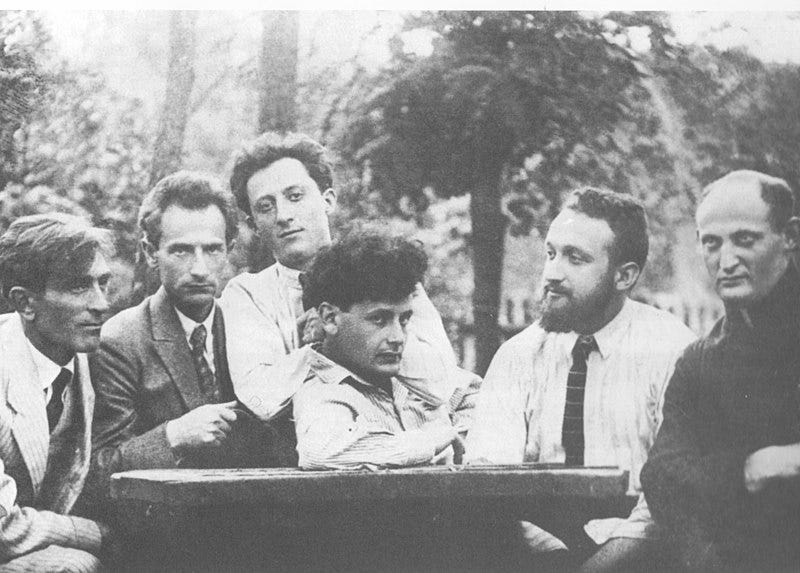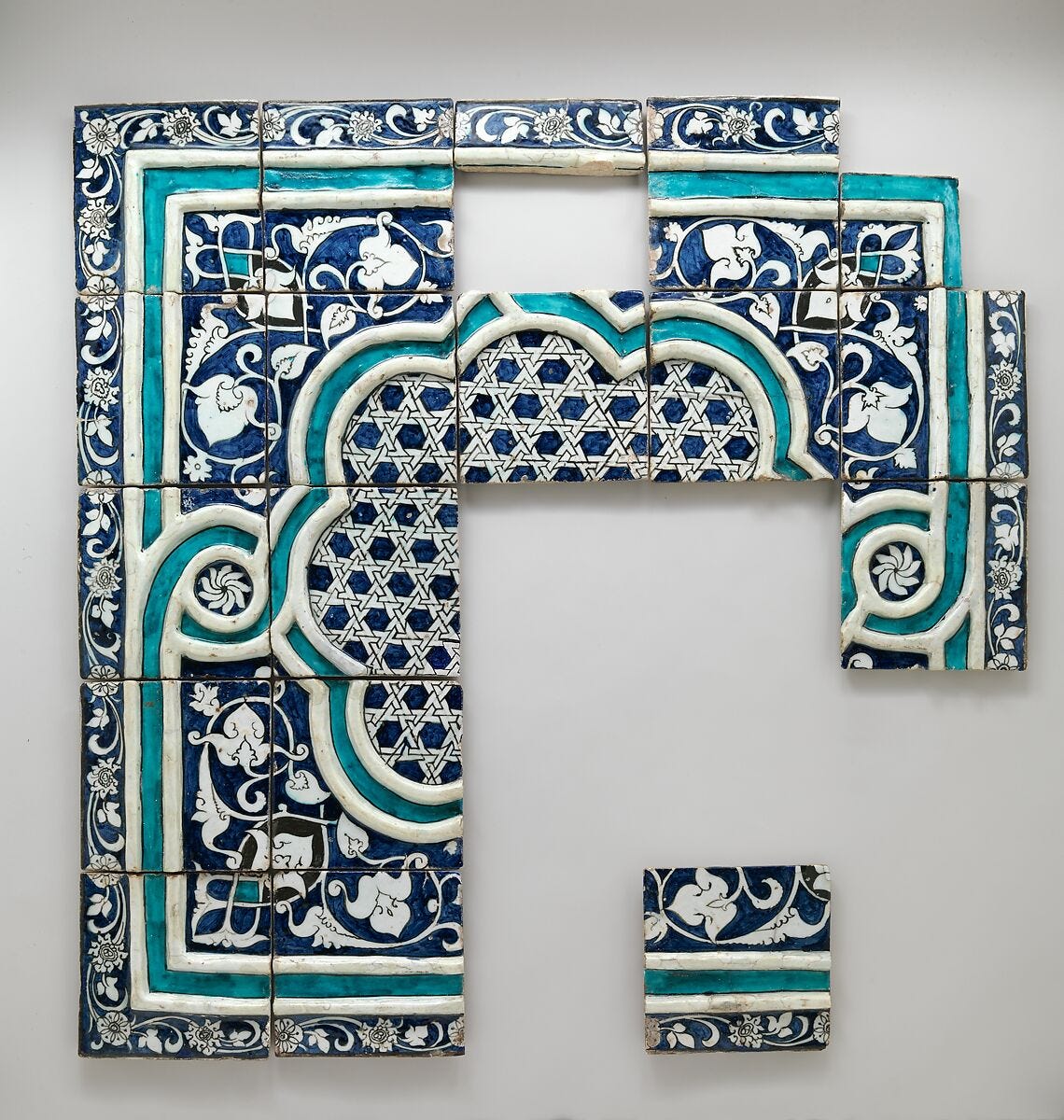Shards
by Peretz Markish
August 12 — tomorrow, as I send this out— marks the anniversary of the so-called Night of the Murdered Poets. On this date in 1952, Stalin’s destruction of Jewish culture culminated in the execution of 13 Soviet Jewish leaders. After years of imprisonment and torture, these 13 men and women were killed on false charges of espionage and treason.
To commemorate this dark anniversary, I shared a poem last year by Peretz Markish, one of that night’s murdered writers, and I’ll return to him again today, with one of his better-known poems, a true favorite of my own. I won’t rehash the biographical background from that post, except to reiterate that a young Markish had great hair — he’s in the center of this 1922 photo, leaning against the table:
The picture above shows the men behind Di Khalyastre, “The Gang,” an avant-garde interwar Yiddish journal in Warsaw. Some of its publications were illustrated by Marc Chagall, like this cool cover page:
You can also find Chagall’s sketched portrait of Markish here.
Last year’s post about Markish includes more about his life, and this piece by Rokhl Kafrissen is a great read about the dynamics of commemorating the Night of the Murdered Poets.
I want to be explicit that, when we talk about this kind of state-sponsored genocidal violence, “history doesn’t repeat itself, but it rhymes,” as the saying goes. In 1952, at the age of 57, Markish, a Ukrainian-born poet, was murdered by Stalin; a few weeks ago, the Ukrainian poet Victoria Amelina was murdered by Putin’s genocidal war machine. It’s easy to commemorate the past’s atrocities, but harder to acknowledge the ways that those atrocities continue.
Before we get to our poem, I’m excited to announce the next Zoom discussion, for paying subscribers. On Tuesday, 8/29, at 7:00 pm EST, we’ll meet to explore the ways that Yiddish poets presented and responded to American anti-black racism and white supremacy. How did Yiddish poets in America, mostly left-leaning immigrants from Europe, use their verse as a way of reacting against the racial violence they encountered here? It’ll be a fascinating program that I’m really looking forward to, and all paying subscribers will get a zoom link.
Below is Markish’s great poem בראָכשטיקער, or “Shards.” Written 75 years ago, it describes an existential predicament that — like the authoritarian violence which took its author’s life — feels quite contemporary.
Shards
Now when my vision turns in, towards itself,
it is a rupture, how my eyes open and everything they are
sees that my heart has fallen like a mirror on a stone,
and with a crash has shattered into pieces.
It is certain that each shard will not be free
to serve as witness for me, not until my destined end.
Do not crush me, my Judge, You, Time,
until I can recover every scattered shard.
I will try to collect them, piece by piece—
to join them again, until my fingers split and bleed—
But no matter how skillfully I put them back together,
I will always see myself in them, ruined and broken.
Now the answer comes to me in grief,
in the agony of fusion. I understand ferociously
the pain of wanting to see myself — whole — in a mirror
whose shards are scattered across the seven seas.
What an incredible image for the agonizing sense of self-estrangement, of inner collapse, of psychic dispersal, that modernity brings. The poet looks inside himself and sees that his heart “has fallen like a mirror on a stone.” What’s left of his spiritual life, of the mirror that once enabled him to see himself clearly? Just jagged shards scattered across the world.
The way this newsletter normally works, I write a sort of mini-essay here, sharing some reflections that I hope will help you to find these poems as meaningful and as vital as I do. But sometimes my love and awe for a poem makes it hard to think of anything to say, beyond: Wow, I really love this poem.
This is one of those times. But can’t love be a helpful hermeneutic in itself? I’ve been sitting here, trying to come up with something smart to say, when perhaps “I love this poem” is the most honest response I can give, and “let me try to say why” is the most helpful commentary.
So why do I love this poem?
The great Russian modernist Marina Tsvetaeva wrote in her diary: "my difficulty (in writing poems—and perhaps other people's difficulty in understanding them) is in the impossibility of my goal, for example, of using words to express a moan: ah—ah—ah.” (This is Ilya Kaminsky’s translation of the Russian.) This is a helpful description of what poetry can do — or, given the impossibility Tsvetaeva identifies, of what poetry can’t do, but does anyway.
When I read much of Markish’s poetry, and this poem in particular, I find the great moan, the inarticulate sense of spiritual homelessness, that I feel as a modern Jew and a modern person, expressed in ways I couldn’t have imagined or anticipated. I know I’m not alone in this. Towards the beginning of Ulysses, the character Stephen Dedalus, a sort of stand-in for James Joyce, watches a dog exploring the beach. The “dog ambled about a bank of dwindling sand, trotting, sniffing on all sides. Looking for something lost in a past life.”
Stephen Dedalus, James Joyce, Peretz Markish, me, maybe you — we’re sniffing around, looking for something that we lost before we were born. Markish’s metaphor for this existential experience is the broken mirror that he knows he can never make whole, even as he must keep trying, with bleeding fingers. Or really we should say that Markish uses two metaphors, layered on top of each other: the first is his heart, and the second is the shattered mirror his heart has become. There is the inner integrity he is looking for, and the broken pieces it leaves behind. And then the compulsion to restore them, the impossible compulsion.
“The pain of wanting to see myself — whole — in a mirror / whose shards are scattered.” Do you know that pain? I want to suggest that it’s an essential part of being a modern human. Maybe it was an essential part of being a pre-modern human too, but I wouldn’t know.
So why do I love this poem? I love it because it makes both intelligible and beautiful a psycho-spiritual experience of fundamental rupture, and of the need to make that rupture whole, with the twinned certainty that this is a need I can never fulfill. This poem gives me language for my experience, which is to say: it makes me legible to myself.
I am genuinely curious to ask: do you find your own experience reflected in this poem as much as I do? And of course, I haven’t even touched on the third stanza about the Judge, Time, and the shards serving as witnesses…. I find this chunk of the poem resonant and haunting and elusive, and I’d love to hear what you make of it in the comments below.
(Side note - for a few reasons I found the Yiddish of this poem exceedingly difficult, one of the most challenging I’ve worked on for this newsletter. Yiddish readers, do you agree that the language here is particularly hard, or have any thoughts on my translation?)
Today’s art pairing: an incomplete tile panel, likely from around 1430, produced by the Damascus workshop of Ibn al-Ghaibi al‑Tawrizi:






Thank you for this poem and your reflection on it! I found both quite moving.
Such an important post! Thank you.